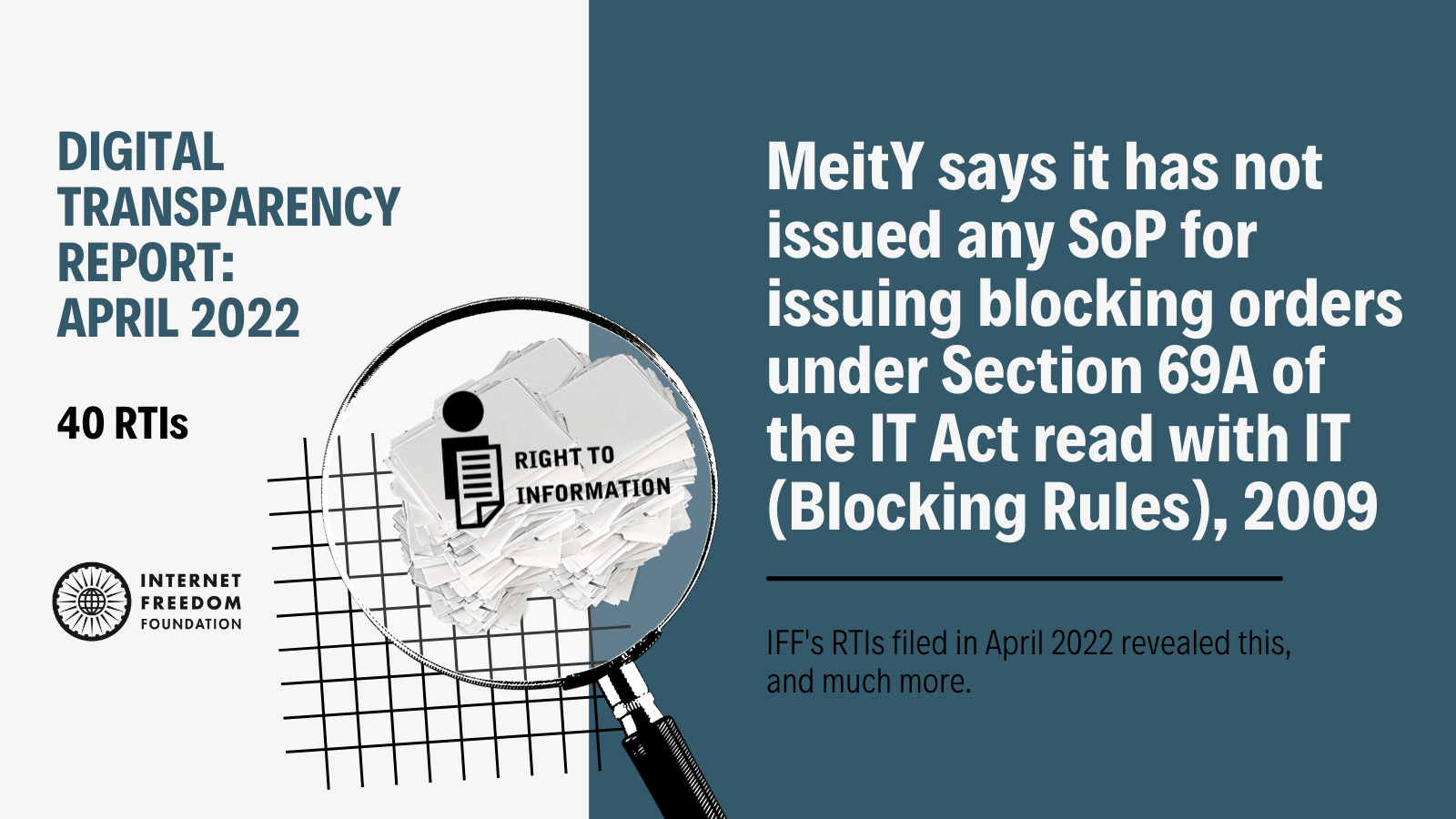
tl;dr
For the month of April 2022, IFF has filed 40 RTI applications. In response to our application seeking information on compliance with the directions of Anuradha Bhasin vs Union of India with the state of Arunachal Pradesh, we found that 7 orders regarding the suspension of telecom services have been issued by the state home department, while Sikkim responded that no internet shutdown orders were issued since 10.01.2020 by the state.
Why should you care?
The Right to Information Act, 2005 (“the Act” or “the RTI Act”) was enacted to promote transparency and accountability in the working of every public authority by ensuring that citizens have access to information under the control of public authorities. Facilitating such access is necessary to ensure that democratic processes are not subverted by public authorities acting under private interests. Where transparency is not upheld as a value of public decision-making, citizens are at a disadvantage when it comes to keeping a check on abuse of power by the public authorities.
As we have discovered previously through responses received on our Right to Information applications, several times various government processes and programs continue with little or no transparency. This happens despite the mandate in the RTI Act, 2005 to proactively publish and disclose information to citizens.
The RTI Act is thus one of the most important tools at the disposal of the public to engage with, and demand transparency and accountability from, the Government. We use the Act to routinely extract information about various ongoing policies and projects that the Government launches.
Data Protection and Privacy
One of our key areas of work is ensuring that public authorities respect data privacy and engage in practices which will ensure that the right to privacy is protected. We filed 9 RTI applications with various authorities this month to ask for information pertaining to projects which affect the data privacy of Indian citizens.
Under IFF’s Project Panoptic, we routinely file RTI applications with various public authorities after we come across news reports that they are developing or using facial recognition technology (FRT). This month, we filed applications with:
- The Ministry of Defence, Western Railway, Bhakra Beas Management Board, and South Western Railway on the use of the Facial Recognition System by them.
- The Ministry of Defence, Western Railway, Bhakra Beas Management Board, and South Western Railway on the procurement of the Facial Recognition technology by them.
- The Ministry of Home Affairs on setting up integrated command centres in smart cities.
For more information on the use of facial recognition technology and how it increases mass surveillance, visit IFF’s Project Panoptic.
Additionally, we also filed applications with:
- The Delhi Police seeking anonymous statistical information regarding orders issued under the Maharashtra Control of Organised Crime Act, 1999.
- The Ministry of Electronics and Information Technology on any Standard Operating Procedure issued by them which provides guidance and/or procedure to be followed for issuing orders under Section 69A of the IT Act.
- The Ministry of Electronics and Information Technology on the public consultation held by the Ministry of Electronics and Information Technology on the draft InDEA 2.0.
- The National Health Authority on the Draft Health Data Management Policy version 02.
- The Ministry of Electronics and Information Technology on setting up of a nodal agency on cybercrime.
- Separate RTIs with Governments of Andaman and Nicobar Islands, Andhra Pradesh, Arunachal Pradesh, Assam, Bihar, Chhattisgarh, Daman and Diu, Delhi, Goa, Gujarat, Haryana, Himachal Pradesh, Jammu and Kashmir, Jharkhand, Karnataka, Kerala, Madhya Pradesh, Maharashtra, Manipur, Meghalaya, Mizoram, Nagaland, Odisha, Puducherry, Punjab, Rajasthan, Sikkim, Tamil Nadu, Telangana, Tripura, Uttar Pradesh, Uttarakhand and West Bengal for any rules made under Section 8 of the Identification of Prisoners Act, 1920.
Significant responses received:
- In response to our RTI application on the Tamil Nadu Data Policy 2022, we discovered that the Tamil Nadu eGovernance Agency held stakeholder consultation with academia, industry and government sector stakeholders but not an open public consultation.
- In response to our RTI application, The Ministry of Electronics and Information Technology responded that they had not issued any Standard Operating Procedure which provided guidance and/ or procedure to be followed for issuing orders under Section 69A of the IT Act read with the Information Technology (Procedure and Safeguards for Blocking for Access of Information by Public) Rules, 2009, including for maintenance/ destruction of such orders.
Free Speech and Censorship
Another focus of our work is to ensure that freedom of speech and expression on the internet is protected and that unnecessary censorship does not lead to a chilling effect on people’s fundamental rights. For this, we routinely file RTI applications to demand accountability for instances that may hamper free speech on the internet such as website blocking or internet shutdowns.
In the last month, we have filed 1 RTI application to demand accountability for violations of free speech on the internet with the Ministry of Home Affairs YouTube channel blocking orders issued by the Ministry in 2021 and 2022.
Significant responses received:
- In a response to our RTI application on the DigiYatra program of the Ministry of Civil Aviation, the Airports Authority of India responded that the penalties imposed, if any, on violation of the High-Level Data Privacy Guidelines as provided in the DigiYatra Policy uploaded on the National Portal of India will be as per the Indian applicable laws. However, India currently does not have data protection legislation.
Important Documents
- Digital Transparency: A Right to Information report for March 2022 dated April 01, 2022. (link)
- Digital Transparency: A Right to Information report for February 2022 dated March 01, 2022. (link)
- Digital Transparency: A Right to Information Report for January 2022 dated February 02, 2022. (link)
The post was drafted with the assistance of Gyan Tripathi, a fourth-year law student from Symbiosis International, Pune, and reviewed by IFF staffer Anushka Jain.
